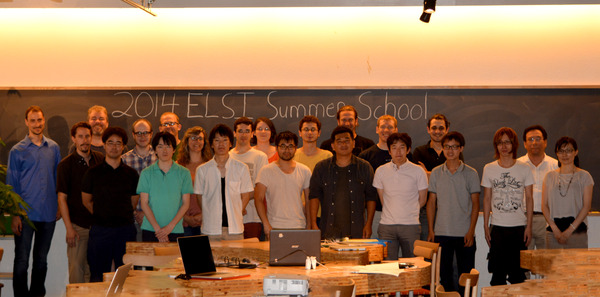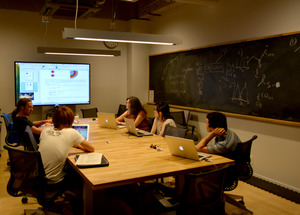ELSI Blog
69 Summer School at ELSI
 As ELSI strives to be the leading institution in the world for all of the disciplines that are housed here from galaxy formation to pre-biotic chemistry (sounds easy enough, right?), we are always looking for opportunities to support our global scientific community. Hosting a Summer School seemed like a great way to bring early-career researchers onto our campus while providing an educational and networking event. The Research Interactions Committee (now the Events and Planning Committee) agreed, and for some crazy reason, I offered to organize and run it. Well, the real reason I took on the challenge was that I had been to successful summer schools in the past (see CIDER http://www.deep-earth.org), and wanted to make sure that ELSI's first attempt met the high standards that exist in our community. Since I was running the event, the focus was computational tools for planetary formation and early Earth evolution, and we kept the program small for the first year to work out all of the "bugs" in the system.
As ELSI strives to be the leading institution in the world for all of the disciplines that are housed here from galaxy formation to pre-biotic chemistry (sounds easy enough, right?), we are always looking for opportunities to support our global scientific community. Hosting a Summer School seemed like a great way to bring early-career researchers onto our campus while providing an educational and networking event. The Research Interactions Committee (now the Events and Planning Committee) agreed, and for some crazy reason, I offered to organize and run it. Well, the real reason I took on the challenge was that I had been to successful summer schools in the past (see CIDER http://www.deep-earth.org), and wanted to make sure that ELSI's first attempt met the high standards that exist in our community. Since I was running the event, the focus was computational tools for planetary formation and early Earth evolution, and we kept the program small for the first year to work out all of the "bugs" in the system.
During the first sweltering days of August, scientists from the UK, Australia, USA, Norway, France, and Japan gathered at ELSI. Having about 25 participants from a variety of fields and countries, we met our goal of providing a small-scale, but truly international event. We were delighted that instructors from the Computational Infrastructure for Geodynamics (CIG) based at the University of California at Davis and a colleague at Oxford University agreed to lead tutorials on free software to simulate mantle dynamics, core dynamo action, and seismograms from earthquakes. In addition, ELSI scientists provided a unique opportunity for participants to use their own, previously unavailable, software for computing galaxy formation and mineral behavior at ultra high pressures and temperatures. Even though this was ELSI's first attempt at hosting such an event, the participants were pleased with their experience in Tokyo and were impressed by the high quality of the tutorials and the skill of the tutorial leaders. One even commented that the tutorials ran more smoothly and efficiently than at a CIDER they had attended in the past. Who knew that compliment would mean so much, the student had now become the master!  A major goal of the Summer School is to attract early-career scientists to become our colleagues and collaborators of the future. Most of the participants were graduate students or post doctoral researchers and several have already expressed interest in joining ELSI as the next step of their career. The ELSI tutorial leaders now have new tools for presenting and sharing their own research, and all of the CIG tutorial codes are installed on ELSI's super computing system for use by our staff and visitors. In addition, after the ELSI Summer School, many participants went on to attend the Studies of the Earth's Deep Interior meeting outside Tokyo and the reviews of the Summer School spread so quickly that I had many people inquire about next year's program. Good news travels fast! The rumor is that we may partner with the Centre for Earth Evolution and Dynamics at the University of Oslo to host next year's Summer School. It seems the Summer School accomplished its goals and more. A huge thanks to the tutorial leaders for their expertise and time and the participants who gave up a weekend in Tokyo to join us for some science.
A major goal of the Summer School is to attract early-career scientists to become our colleagues and collaborators of the future. Most of the participants were graduate students or post doctoral researchers and several have already expressed interest in joining ELSI as the next step of their career. The ELSI tutorial leaders now have new tools for presenting and sharing their own research, and all of the CIG tutorial codes are installed on ELSI's super computing system for use by our staff and visitors. In addition, after the ELSI Summer School, many participants went on to attend the Studies of the Earth's Deep Interior meeting outside Tokyo and the reviews of the Summer School spread so quickly that I had many people inquire about next year's program. Good news travels fast! The rumor is that we may partner with the Centre for Earth Evolution and Dynamics at the University of Oslo to host next year's Summer School. It seems the Summer School accomplished its goals and more. A huge thanks to the tutorial leaders for their expertise and time and the participants who gave up a weekend in Tokyo to join us for some science.











